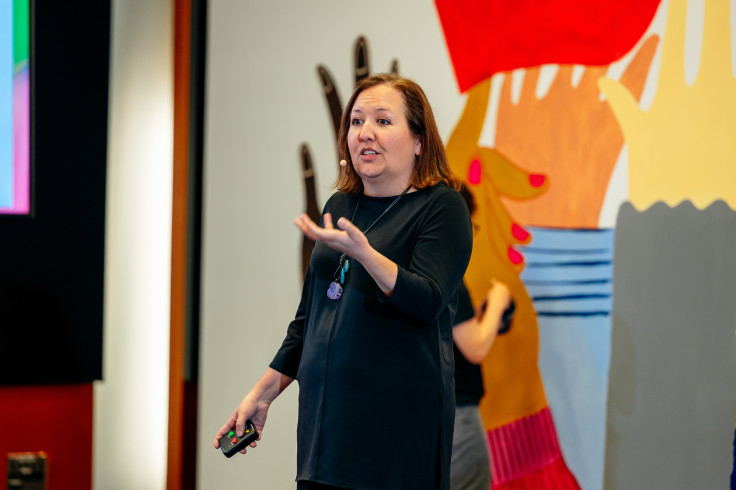
Monica Talan, a 52-year-old Mexican raised in Texas, had dedicated her entire life to corporate communication until 2020, when she became interested in the world of Bitcoin as an investment tool during the pandemic.
Decentralized technology and cryptocurrencies captivated her, leading what was once a personal interest to become a newfound vocation.
A year later, having pursued both independent learning and courses at the Massachusetts Institute of Technology [MIT], she founded CryptoConexion, a website that provides information in Spanish to the Latino audience in the United States, as well as to people throughout the Spanish-speaking world seeking to bring financial education to this community.
One of the guiding principles shaping the website's mission is the belief that "decentralized innovation represents a pathway to enhance financial inclusion."
In an interview with The Latin Times, Talan explained the reasoning behind this conviction and how she sees the future of the crypto ecosystem amidst the rise of Bitcoin's price, which surpassed $51,000 this Wednesday.
The following interview was edited for clarity and length.
-Lately, it seems every Bitcoin's price analysis is a "buy the rumor, sell the news" phenomenon. This happened with the expected approval of Bitcoin spot ETFs, which was believed to trigger a surge in the price of Bitcoin, yet it did not materialize in the short term. Could the same thing happen with the halving?
-This is a very volatile ecosystem. You have to be very careful if you decide to invest, knowing that you might lose your investment. So invest only what you can afford to lose, and be very careful because unfortunately, while the technology itself is very secure, there are people around it who are not trustworthy. For us, the ecosystem is growing, and it's crucial for us that Spanish speakers, Latin Americans, are aware and can participate in an informed manner.
The cycle we're entering is something many expected, especially when the ETFs were approved, and now that the halving is coming. I think some people thought it would reach $50.000 when the ETF was approved, but if you follow the ecosystem, you also know that many people were waiting for approval to sell for a little return, what they call 'shorts,' right? So I wasn't expecting Bitcoin's price to rise so much.

-On your website, there is now a countdown for the halving event, which is scheduled for April. Why is this event so significant?
-People monitor the Bitcoin halving because historically Bitcoin's value tends to go up during those events. So one of the expectations is that it will impact the valuation of cryptocurrencies. What happens is that right now, when a person mines Bitcoin, they receive a reward for mining these cryptocurrencies. The halving is when the value of that reward is halved, and it can also slow down the process of mining Bitcoin a little. This also contributes to the expectation that the value of the cryptocurrency, specifically Bitcoin, will increase. But as you know, when Bitcoin rises, everything around it rises too.
-You've touched upon the topic of security and scams related to cryptocurrency. Which are the mechanics of these scams?
-Many people fall into scams because people promise them "I'm going to buy, I'll help you invest, and it will help your money grow." People send them the money, but that person isn't actually investing in cryptocurrencies. In Latin America, you also see a lot of scam issues with pyramid schemes. As I've always said, cryptocurrencies are about managing your money. You shouldn't send your money to anyone else. You should manage your investment, your portfolio, and everything because that's why it's decentralized, but unfortunately many people fall into these types of scams. There are even romantic scams, where on the same social networks where people are looking for dates, people are scamming others with cryptocurrencies. So, unfortunately, it's like with everything related to money, there will always be people trying to steal from you.
-What would be your advice?
-The most important thing is to educate oneself. Don't trust blindly. Always verify things thoroughly, right? Don't just send your funds to anyone. And if you have cryptocurrencies, always verify if you're going to be sending them to someone, don't just click on something that seems trustworthy.
-Is investment the primary objective for Latinos within the crypto ecosystem?
-In the United States, it's seen more as an investment instrument. What many people in the U.S. don't know that Latinos are the ones who invest the most in cryptocurrencies. Then it's followed by Blacks and then Whites. In Colombia and Mexico, you're seeing a lot of activity in using cryptocurrencies for remittances, because it's faster, cheaper and sometimes safer. It's something that has been happening a lot since 2022, especially because companies like Bitso were facilitating it. In Argentina and Venezuela, you're seeing more use as currency or store of value because of the devaluation of each country's currency. And in Brazil, you're seeing a combination of all these things because it's one of the countries that has regulation and is one of the countries that is leading much of the technological innovation.
-Why do you think so many Latinos in the U.S. are choosing to invest in cryptos?
-With cryptocurrencies, it's easier. In the United States, there are many rules that define when you can invest and how you can invest in the stock market. You have to open a bank account, and then you have to have an account on a platform like Fidelity, and there's not much education. And also, if you want to invest in some companies that may not necessarily be on the stock exchange already, you have to prove that you earn at least $250,000 a year. So, there's a financial barrier to some investments that you don't have in the crypto world. I do think it can help with democratization, as we're already seeing it in remittances.
-Why?
-For me, the fact that you can speed up payment and save ten or fifteen percent on exchange costs is significant, as that percentage can directly benefit the economy. That's why I have strong faith in the decentralized world, but I don't believe it should replace fiat currency. Instead, I see it as an ecosystem that is expanding, offering additional transaction options.
-What is your objective as a Latina communicator within this ecosystem?
-When I started researching, I noticed a lack of educational information available in Spanish. In this ecosystem, there is a lot of terminology that isn't easily understandable. So, we launched CryptoConexión on October 31, 2021, to coincide with the date the Bitcoin whitepaper was published. Since then, we've created over 100 free tutorials in Spanish. We've also developed Portuguese content to support all of Latin America and engaged in various projects such as workshops and initiatives to help more people comprehend this decentralized world.
© 2024 Latin Times. All rights reserved. Do not reproduce without permission.







